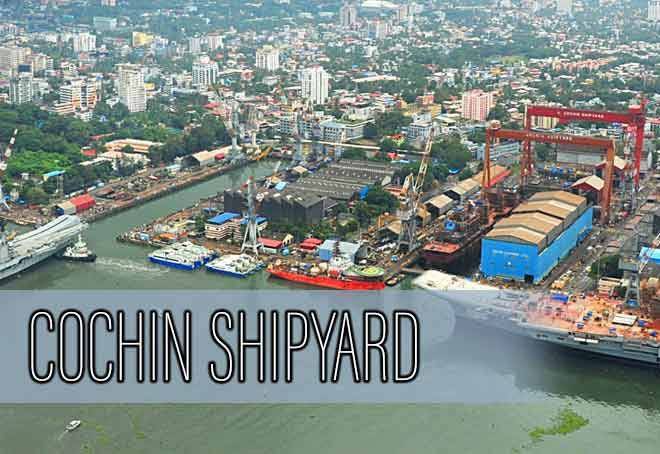Add your promotional text...
Navigating Cochin Shipyard Investments: Pros and Cons Explained
Explore the investment landscape of Cochin Shipyard Limited (CSL) with a detailed analysis of its market strengths, strategic advantages, and potential pitfalls. This guide covers CSL's dominant market position, government support, financial resilience, technological advancements, and the challenges posed by industry cyclicality, competitive pressures, and regulatory dynamics. Whether you're a seasoned investor or evaluating new opportunities, this comprehensive overview will help you make informed decisions about investing in CSL.
TRENDING STOCKS
By Aman Jaiswal
6/19/20243 min read


Investing in Cochin Shipyard Limited (CSL) demands a thorough understanding of its current market position, strategic initiatives, and external market dynamics. This blog aims to provide a comprehensive analysis of the pros and cons of investing in Cochin Shipyard right now. Whether you’re a seasoned investor or exploring new opportunities, this guide will help you make an informed decision.
Overview of Cochin Shipyard Limited
Cochin Shipyard, established in 1972, is one of the largest shipbuilding and maintenance facilities in India. Located in Kochi, Kerala, CSL operates under the ministry of Shipping, Government of India. The company specializes in constructing and repairing a wide range of vessels, including tankers, passenger ships, offshore vessels, and more recently, aircraft carriers and submarines. With a robust infrastructure and skilled workforce, CSL has carved a niche in both domestic and international markets.
Pros of Investing in Cochin Shipyard
1. Dominant Market Position
Cochin Shipyard enjoys a dominant position in the Indian shipbuilding industry. It is the largest public sector shipyard in India by dock capacity and has a proven track record of delivering high-quality vessels. The company’s reputation for timely project execution and adherence to international standards enhances its attractiveness to both government and private sector clients.
2. Government Support and Projects
As a public sector enterprise under the Ministry of Shipping, CSL benefits from consistent government support. The Indian government’s focus on enhancing maritime infrastructure and promoting domestic shipbuilding capabilities further bolsters CSL’s project pipeline. Government contracts provide a stable revenue stream and mitigate some market risks associated with private sector volatility.
3. Diversification and Expansion
Cochin Shipyard has diversified its portfolio beyond traditional shipbuilding to include repairs, refits, and engineering services. The company’s foray into building specialized vessels like aircraft carriers and submarines demonstrates its capability to handle complex projects. This diversification strategy not only broadens CSL’s revenue sources but also positions it competitively in the global shipbuilding market.
4. Strong Financial Performance
In recent years, Cochin Shipyard has shown resilience amidst economic fluctuations. The company has reported steady revenue growth and profitability, reflecting efficient cost management and operational excellence. Solid financial health is crucial for sustaining dividend payouts and attracting institutional investors, thereby supporting long-term stock price appreciation.
5. Technological Advancements
CSL has invested in modernizing its facilities and adopting advanced shipbuilding technologies. Embracing digitalization and automation in ship design and construction processes enhances efficiency and reduces production time. Technological advancements also enable CSL to offer innovative solutions that meet stringent environmental and safety standards, thereby attracting environmentally conscious clients.
Cons of Investing in Cochin Shipyard
1. Cyclical Nature of Shipbuilding Industry
The shipbuilding industry is inherently cyclical, susceptible to fluctuations in global trade, oil prices, and geopolitical tensions. Economic downturns or geopolitical conflicts can impact new orders and delay project executions, affecting CSL’s revenue and profitability. Investors need to consider the industry’s cyclicality and its potential impact on CSL’s financial performance.
2. Dependency on Government Contracts
While government contracts provide stability, CSL’s dependency on them exposes the company to regulatory changes and bureaucratic delays. Government procurement processes can be lengthy, affecting revenue recognition and cash flow. Investors should monitor CSL’s contract pipeline and government policy shifts that may influence its project execution timeline and financial outcomes.
3. Competitive Market Landscape
Cochin Shipyard faces competition from domestic and international shipyards, including private sector players with significant financial resources and established market presence. Competing on cost, quality, and delivery timelines remains crucial for CSL amidst intensifying global competition. Investors should assess CSL’s ability to maintain competitive advantage and secure profitable contracts in a competitive market environment.
4. Capital Intensive Operations
Shipbuilding and related services require substantial capital investments in infrastructure, technology, and skilled labor. CSL’s capital expenditure needs to align with its growth strategy and project demands. Managing capital allocation efficiently is essential for sustaining profitability and optimizing return on investment, especially during economic downturns or industry slowdowns.
5. Environmental and Regulatory Risks
The shipbuilding industry faces increasing scrutiny regarding environmental impact and regulatory compliance. CSL must adhere to stringent environmental regulations and safety standards, which may entail additional costs and operational complexities. Investors should consider CSL’s sustainability initiatives and regulatory compliance record when evaluating long-term investment prospects.
In Conclusion, Investing in Cochin Shipyard offers both opportunities and challenges, influenced by its market position, government support, financial performance, technological advancements, and industry dynamics. While CSL’s dominant market position and government backing provide stability and growth prospects, investors must weigh potential risks such as cyclicality, competitive pressures, dependency on government contracts, and regulatory challenges.
Before making investment decisions, conduct thorough research, assess CSL's financial health, review industry trends, and consider your risk tolerance. By staying informed and vigilant, investors can capitalize on opportunities presented by Cochin Shipyard while navigating potential challenges effectively.
